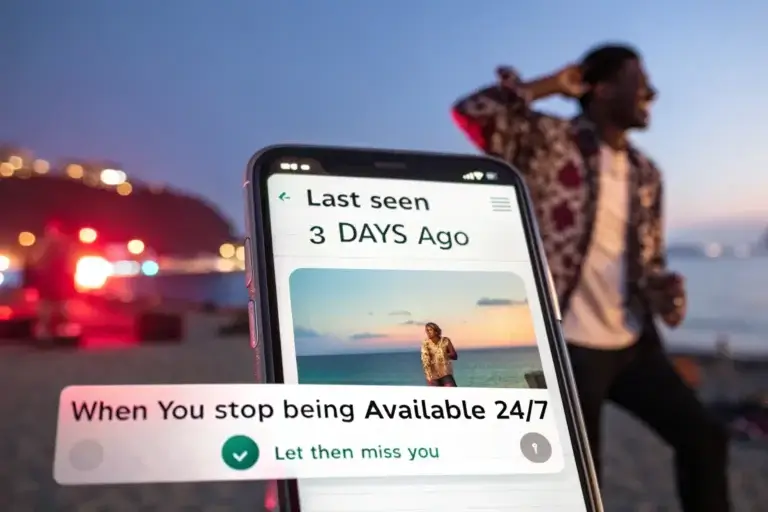Have you ever noticed how the people who seem most desired are often the ones who are least available? It’s not coincidence—it’s psychology. Right now, as you read this, you might be that person who always answers immediately, who’s always there when someone needs you, who gives endlessly without receiving the same energy back. But here’s the uncomfortable truth: your constant availability might be the very thing that’s making others take you for granted and diminishing your value in their eyes.
What if I told you that stepping back—strategically and intentionally—could transform your relationships overnight? That by learning to let them miss you, you could reclaim your power, restore balance, and finally get the appreciation you deserve? Keep reading, because we’re about to dive deep into the psychology of absence, attraction, and self-worth that could change everything about how you approach relationships.
What Does “Let Them Miss You” Actually Mean? (It’s Not What You Think)
Let them miss you doesn’t mean disappearing without explanation or playing manipulative games. It’s about creating intentional emotional space that allows others to truly appreciate your presence. This powerful relationship strategy works because it taps into fundamental human psychology: we value what we can’t always have.
When you let someone miss you, you’re essentially giving them the gift of perspective. You’re allowing them to experience life without your constant presence, which makes them realize just how much you contribute to their happiness and well-being.
This concept applies to all types of relationships:
- Romantic partnerships where you’ve become too available
- Friendships where you’re always the one reaching out
- Family dynamics where your efforts go unnoticed
- Professional relationships where you’re undervalued
The Hidden Cost of Always Being Available: Why Overgiving Backfires
Here’s the paradox that most people don’t understand: the more available you make yourself, the less valuable you become in others’ eyes. When you’re always there, always responding, always giving, you inadvertently train people to expect your presence without appreciating it.
The psychological consequences of constant availability include:
Emotional burnout – You exhaust yourself trying to meet everyone’s needs while neglecting your own.
Decreased self-worth – When your efforts aren’t reciprocated, you start questioning your value.
One-sided relationships – You become the giver while others become comfortable taking.
Loss of mystery and attraction – Predictability can diminish the excitement others feel about you.
Enabling dependency – Others become reliant on your constant support without developing their own coping mechanisms.
The harsh reality? People often treat as common what they can access easily. Your constant availability signals to others (subconsciously) that your time, energy, and attention aren’t scarce resources—and therefore, not particularly valuable.
The Psychology of Missing Someone: Why Absence Increases Attraction
The “let them miss you” strategy works because it leverages several powerful psychological principles:
The Scarcity Principle
Humans naturally value what’s rare or limited. When your presence becomes less predictable, it automatically becomes more precious. This isn’t manipulation—it’s basic human psychology.
The Contrast Effect
When someone is used to your constant availability and suddenly experiences your absence, the contrast is striking. They begin to notice all the ways you usually contribute to their life.
Emotional Reflection
Distance creates space for genuine reflection. Without your constant presence, people have time to think about what you mean to them and how you enhance their life.
The Dopamine Effect
The uncertainty of when they’ll next hear from you creates anticipation, which triggers dopamine release—the same chemical that makes experiences feel rewarding and exciting.
How to Let Them Miss You: The Strategic Approach
1. Stop Over-Communicating
Instead of sending multiple texts or always being the first to call, pull back. Let conversations end naturally without rushing to fill every silence.
2. Create Intentional Delays
You don’t need to respond immediately to every message. Take time to craft thoughtful responses, and don’t feel obligated to be constantly available.
3. Focus on Your Own Life
The best way to become more interesting to others is to become more interested in your own life. Pursue hobbies, goals, and experiences that fulfill you independently.
4. Practice Selective Availability
Be present when you choose to be, but don’t make yourself available for every request or need. This teaches others that your time is valuable.
5. Maintain Your Standards
Don’t lower your standards or chase after people who don’t reciprocate your energy. Hold space for those who genuinely appreciate you.
The Difference Between Self-Respect and Manipulation
It’s crucial to understand that letting them miss you should come from a place of self-respect, not manipulation. Here’s how to tell the difference:
Self-Respect Approach:
- You step back to protect your own energy
- You’re not trying to control anyone’s behavior
- You’re honoring your own needs and boundaries
- You’re willing to accept whatever outcome occurs
Manipulation Approach:
- You withdraw to punish or control someone
- You’re trying to force a specific response
- You’re playing games to get attention
- You’re using silence as a weapon
The key difference? Intention. When you let them miss you from self-respect, you’re taking care of yourself first. When you do it for manipulation, you’re still making it about controlling others.
Signs It’s Time to Step Back in Your Relationships
Recognizing when to implement this strategy is crucial. Here are the red flags that indicate you might need to let them miss you:
- You’re always the first to initiate contact
- Your efforts consistently go unacknowledged
- You feel emotionally drained after interactions
- There’s a clear imbalance in effort and investment
- You sense being taken for granted
- You’re constantly available but others aren’t reciprocating
- You feel like you’re chasing rather than being pursued
If multiple signs resonate with you, it’s time to step back and create some healthy distance.
The Transformative Power of Strategic Absence
When you successfully let them miss you, several powerful things happen:
They Notice Your Absence – What was once background noise becomes a noticeable void in their daily experience.
They Reevaluate Your Worth – Without your constant presence, they begin to recognize all the ways you contribute to their life.
They Experience Longing – The human heart grows fonder in absence, creating genuine desire for your return.
You Regain Perspective – Distance allows you to see the relationship more clearly and determine if it’s truly serving you.
Balance Gets Restored – The relationship dynamic shifts from one-sided to more mutual.
Common Mistakes to Avoid When Letting Them Miss You
While this strategy can be powerful, it’s easy to implement incorrectly. Avoid these common pitfalls:
Going Silent Without Context
Don’t disappear completely without any explanation. This can create confusion and anxiety rather than appreciation.
Making It About Punishment
If you’re stepping back to punish someone, you’re approaching this wrong. The goal is self-care, not revenge.
Expecting Immediate Results
Give the process time to work. Some people need longer to recognize and appreciate your value.
Breaking Your Own Boundaries
Don’t cave at the first sign of their attention. Maintain your standards consistently.
Losing Yourself in the Process
Remember, this is about honoring your worth, not becoming someone you’re not.
The Long-Term Benefits of Letting Them Miss You
When implemented correctly, this approach creates lasting positive changes:
Enhanced Self-Respect – You learn to value your own time and energy appropriately.
Stronger Relationships – The relationships that survive this test become more balanced and fulfilling.
Increased Attraction – You become more interesting and desirable to others.
Better Boundaries – You develop healthier limits in all your relationships.
Emotional Independence – You become less dependent on others for validation and happiness.
Natural Selection – This process helps you identify who truly values you versus who was just comfortable using you.
When to Use This Strategy (And When Not To)
Use “Let Them Miss You” When:
- You’re consistently overgiving without reciprocation
- You feel taken for granted in the relationship
- There’s a clear imbalance in effort and investment
- You need to restore your own sense of self-worth
- The relationship has become one-sided
Don’t Use This Strategy When:
- The other person is going through a genuine crisis
- You’re in a healthy, balanced relationship
- You’re doing it purely for manipulation
- You’re not prepared for the relationship to potentially end
- You’re using it as a test or game
Real-Life Examples: How Letting Them Miss You Works
In Romantic Relationships
Sarah had been dating Mark for six months but felt like she was always the one planning dates and initiating contact. She decided to step back and focus on her own life. Within two weeks, Mark started reaching out more frequently and began putting effort into planning their time together.
In Friendships
Tom realized his friend group only contacted him when they needed something. He stopped being the one who always organized hangouts and made himself less available. The friends who truly valued him started making more effort, while the ones who were just using him faded away naturally.
In Family Dynamics
Lisa had been the family caretaker for years, always available for every crisis. When she started setting boundaries and becoming less available, her family members began to appreciate her efforts more and started handling some issues independently.
The Science Behind Why This Works
Research in psychology supports the effectiveness of strategic absence in relationships:
Intermittent Reinforcement – Variable and unpredictable contact creates stronger psychological bonds than constant availability.
The Mere Exposure Effect – While we like familiar things, too much exposure can lead to boredom and decreased appreciation.
Attachment Theory – Secure attachment actually requires some degree of independence and space between individuals.
Dopamine and Anticipation – The brain releases more dopamine when rewards are unpredictable, making the experience more pleasurable.
Conclusion: Reclaim Your Power by Letting Them Miss You
The art of letting them miss you isn’t about playing games or being manipulative. It’s about recognizing your own worth and refusing to accept less than you deserve. When you step back from relationships where you’re undervalued, you create space for genuine appreciation to grow.
Remember: your presence should be a gift, not a guarantee. Your time should be treasured, not taken for granted. Your energy should be reciprocated, not depleted.
By implementing this strategy from a place of self-respect and emotional maturity, you transform not just your relationships, but your entire relationship with yourself. You teach others how to treat you by showing them what you’ll accept—and what you won’t.
Sometimes the most powerful thing you can do is nothing at all. Sometimes the loudest message you can send is silence. And sometimes, the only way to be truly valued is to step away and let them remember what they’re missing.
Your worth doesn’t diminish when someone fails to see it. But your peace of mind will flourish when you stop trying to prove it to people who aren’t paying attention.
Let them miss you. Let them remember your light. And while they do—keep shining for yourself.

